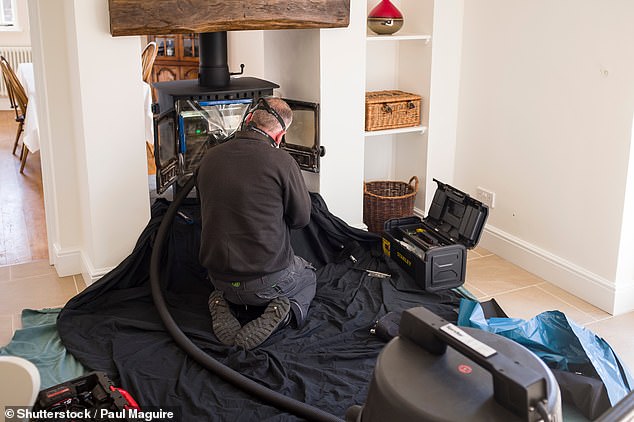I recently bought a house with a wood stove and I’m looking forward to using it now that the weather is getting colder.
I’ve never used one before and don’t want to break the various rules I understand now govern these stoves. I suspect mine is several decades old and may not meet modern standards.
I live just outside Tonbridge in Kent and have access to endless free wood from a local farmer. Can I burn it without problems?
This is Money’s Sam Barker responds: You are right that the rules regarding wood stoves are confusing and there are fines of up to £1,000 for using them incorrectly.
All of these rules are intended to improve air quality or prevent fires, so they are not useless red tape.
Fortunately for you, many of these rules don’t apply to your circumstances. But it’s worth laying out these rules to explain exactly why.
New solid fuel stoves installed from January 1, 2022 must meet government ecodesign standards, which limit emissions.
Similarly, the 2010 Building Regulations introduced fire safety standards around the hearths of newly installed solid fuel stoves, including how thick and wide they must be.
But your stove predates any of these rules, so you can continue using it.
Safety first: Wood stoves should be swept at least once a year by a professional chimney sweep.
The only rules you need to follow are those that apply to all solid fuel domestic stoves, regardless of when they were installed.
The first of them are the smoke control zones, which are managed by the town councils. Tonbridge is not in any, but most urban areas are.
As the name suggests, they are intended to limit the amount of smoke produced in an area.
When applied to the type of stove we might have in our homes, this means that someone in a smoke control zone can only burn smokeless fuel (an environmentally friendly alternative to coal).
If they have a Defra-exempt stove, they can also burn fuel that meets the criteria for that stove, usually very dry wood.
Breaching these rules means incurring fines of up to £1,000 if you are caught, although councils will usually notify you first.
But you still have to obey the rules about what you can burn on your stove.
For starters, traditional charcoal is not allowed and its sale has been banned in England from May 2023.
Retailers also cannot sell “wet” wood with a moisture content higher than 20 percent, as it emits more harmful smoke.
In theory, this means that even outside a smoke control zone no one should be able to buy fuel that is highly polluting.
However, he does not buy wood, but rather sources it from a local farmer.
If these logs are not adequately seasoned, that is, with a moisture content of 20 percent or less, they should not be burned.
Not only will they not produce much heat, but they will also produce a lot more smoke.
This smoke is harmful to the environment and neighbors, and can also cause a buildup in the chimney that poses a serious fire risk.
Because you are not in a smoke control zone and you have a pre-2022 stove, your council cannot easily fine you for improper use of a wood stove.
However, if your stove produces a lot of smoke, your neighbors could complain to the council’s environmental health team.
They may well warn you to burn approved fuel or drier wood, but they are unlikely to impose a fine.
It’s also possible that angry neighbors will sue you for causing a nuisance with a smoky stove, but that’s even more unlikely.
In short, burn seasoned or kiln-dried wood, or smokeless fuel if your stove is designed for it. That will keep you warm and on the right side of all the rules and regulations.
It’s also a good idea to get a smoke and carbon monoxide detector, and clean and check the chimney before you start burning anything.
Do you have any questions about energy? Get in touch: editor@thisismoney.co.uk
Some links in this article may be affiliate links. If you click on them, we may earn a small commission. That helps us fund This Is Money and keep it free to use. We do not write articles to promote products. We do not allow any commercial relationship to affect our editorial independence.



